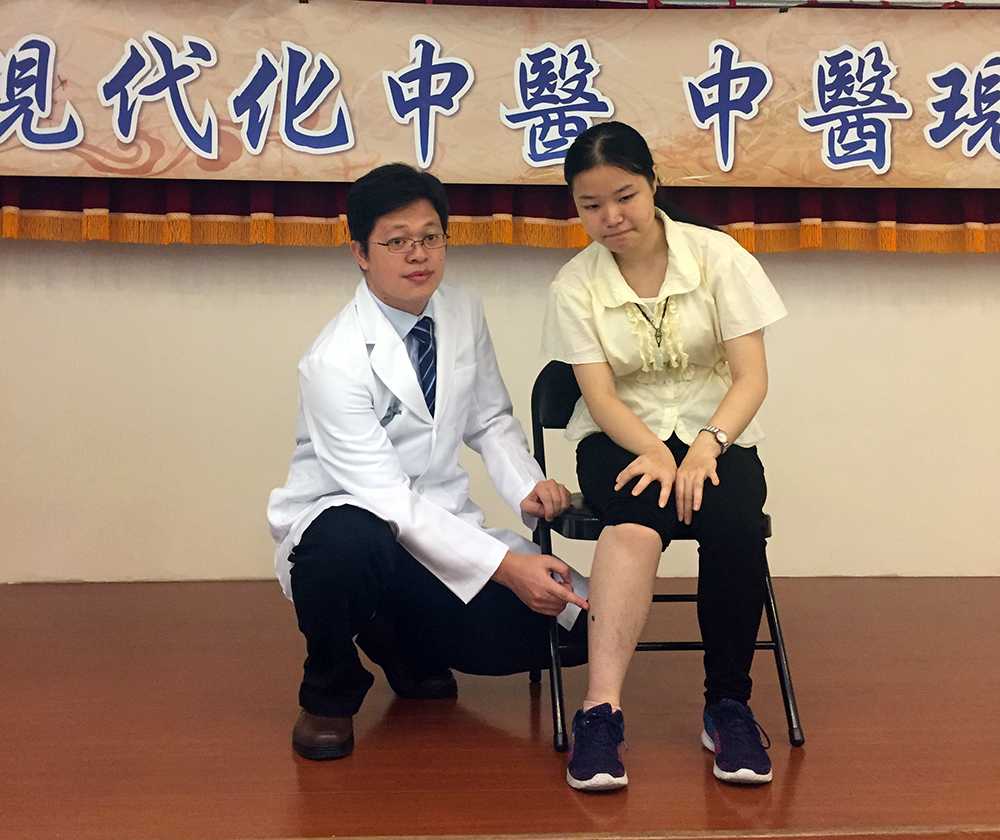News and Award
About CMUH
Acupuncture as adjunct therapy for cancer treatments relieves patients' pain and discomfort. Simple, effective, affordable

Cancer is the first of the top ten causes of death. Most cancer patients will choose surgery, radiation therapy, chemotherapy, target therapy or hormone therapy. During the treatments, they may encounter uncomfortable syndromes: pain caused by tumor compression or invasion in nerve; post-surgical wound pain, gastrointestinal dysfunction, and bowel obstruction; nausea, vomiting, loss of appetite, dizziness, numbness of limbs, fatigue, depression, and insomnia during chemotherapy; dry-mouth, alteration in taste, neuritis, and limbs and trunk pain after radiation therapy; hot flushes, hyperhidrosis, chest tightness, palpitation, and joint pain after hormone therapy.
According to Dr. Ming-Cheng Huang, a patient, Ms. Yang, received chemotherapy and radiation therapy due to breast cancer metastasis to the lumbar spine. The patient suffered from pain, caused by tumor compression in nerve, in her left-side buttock and left lower limb. Morphine was introduced to relieve her constant pain; however, she was sensitive to morphine even at a lower dose which caused her dizziness, nausea, and vomiting. After receiving acupuncture treatment, she was able to not only lie down to rest without severe pain but also reduced the dosage of morphine.

Medical studies support acupuncture as pain relief for cancer treatments.
A statement issued by the U.S. National Institutes of Health (NIH) in 1997 demonstrated that acupuncture successfully reduced post-surgical pain and chemotherapy-induced nausea and vomiting.
Worldwide researchers have published hundreds of paper on the effectiveness of acupuncture for cancer sequela, and established medical evidence. Several cancer centers in the U.S. have set up the department of integrated and alternative medicine, providing acupuncture as an adjunct therapy for patients to relieve discomfort occurred during cancer treatments. National Cancer Comprehensive Network, NCCN, has recently published in the cancer treatment guideline that acupuncture is a part of cancer-related pain management.
Dr. Huang believes that acupuncture, a procedure in Traditional Chinese Medicine, is a unique treatment to stimulate body meridians and acupuncture points, activating the meridian system to circulate Qi and blood and repair organs' function. Clinical investigations have shown that acupuncture relieves cancer-related pain. In terms of pain relief, acupuncture combined with painkillers has better effectiveness than painkillers alone. This result has been supported by several international journals for Medicine as well as Evidence-based Complementary and Alternative Medicine. Dr. Huang argues that acupuncture has simple and compelling advantages of stimulating circulation of body meridians as well as Qi and blood. The procedure allows patients to reduce usage and dosage of medicine, giving them less burden on liver and kidney. Moreover, its clinical treatment rarely shows side effect. For patients who suffer from pain caused by cancer treatments, acupuncture is an optimum option.
Dr. Ming-Cheng Huang, Division of Acupuncture, Department of Traditional Chinese Medicine, CMUH.



![[Taiwan–Malaysia Medical Innovation Forum] CMUH and UNIMAS Co-Host Major Medical Symposium to Advance Medical Technology and Precision Patient Care img](/FileUploads/News/20250714_131324.jpg?w=250&h=180&mode=crop&scale=both)